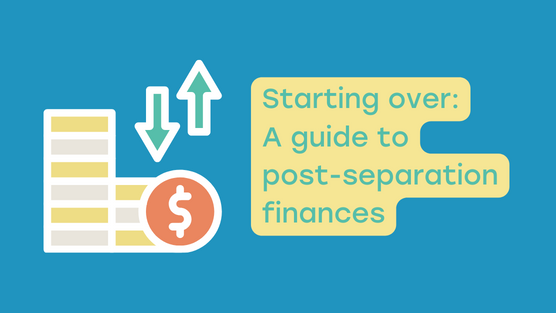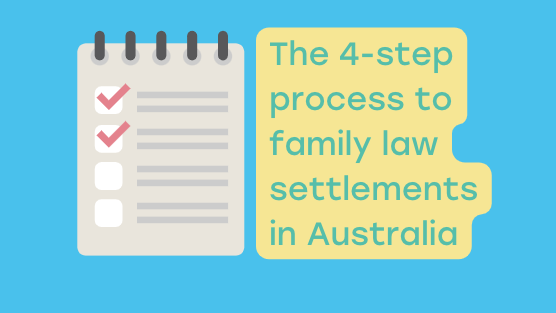Life post-separation can be difficult to navigate. There’s a lot to grapple with, practically and emotionally. Even if the split is positive for you, all the change can still be unsettling. Rebuilding your finances can seem a long way off as you get through the day-to-day. But here’s the thing – taking control of your money can actually be a lifeline and a way to steady your footing.
This blog explores how understanding your financial landscape, building a budget that works for you, and finding resources to guide you can give you some mental space to focus on rebuilding other parts of your life.
Find your legal and financial guides
Don’t go it alone. Splitting finances with your ex and structuring your assets afterwards is complex. Seek the help of a family lawyer and a financial coach or advisor. Their guidance can be invaluable in making informed financial decisions. Without professional advice, you don’t know what you don’t know. Don’t lose out on a fair split by trying to do it all yourself.

Get the support you need
Take our Q&A to get your own tailored Support Hub and recommendation to trusted professionals to support all your financial needs.
Get my personal Support HubUnderstand your financial landscape
Before diving into budgeting, take stock of your current financial situation. Assess your assets, liabilities, and sources of income. Speak to Services Australia about any benefits or concessions you may be eligible for in your new circumstances that can boost your income. Understanding your financial landscape provides a solid foundation for effective budgeting.
Create a post-separation budget
Next, a budget becomes your map – it’s so important to know where your money is going and to have a good idea of your short and long-term financial position. List your needs first – housing, food, bills, childcare and healthcare. Then, add in what matters to you – hobbies, spending time with loved ones, pursuing a dream. It doesn’t have to be perfect – it’s not set in stone. You’ll adjust this map as you go.
Plan for the unexpected
Life is unpredictable – separation has already shown you that that. A contingency fund is an essential part of any budget. Set aside some money for unexpected expenses to ensure that you’re prepared for any financial curveballs.
Long-term financial security
A sustainable financial plan accounts for your lasting security. Even if it seems like retirement is a long way off, look beyond your immediate future and consider retirement and other long-term financial goals.
Face your debts
Address your existing debts and formulate a repayment plan. A common pitfall in managing post-separation debts is the trap of piling on more credit. You can chip away at this mountain, one step at a time. Work out a plan and prioritise high-interest debts first.
Adapting to your single circumstances
Life after separation means saying goodbye to some things and hello to others, often requiring adjustments to your lifestyle and spending habits. You might find joy in simpler pleasures, discover new ways to save, and learn to appreciate the little things. Remember, it’s not about deprivation, but about finding what truly matters to you.
The needs of your family
If you have children, their needs become part of your map. Talk to your co-parent, share the journey, and make sure the kids’ wellbeing is always at the forefront. Reach out to [Child Support Consultants] for a chat if you need guidance on how to assess and manage your payments.
Explore employment opportunities
Lots of people change more than their partner when they separate. It’s a time to reassess other things too, like your career Maybe you’ll re-enter the workforce, embrace a promotion opportunity you have forgone in the past, or find a passion you never knew existed. And a new role could support you in rebuilding your finances sooner.
Take care of your wellbeing
This is a tough one – being stressed affects our ability to make rational decisions. Unfortunately, separation is one of the most stressful situations a person can experience. Worrying about your situation and your financial position can have you in fight-or-flight mode, which really effects how you make your financial decisions.
Research shows that even taking a few seconds to think about your long-term goals before making a financial decision can help counteract stress’s negative effects. And if you focus on the big picture and your longer-term financial goals, you’re more likely to feel in control of your life and finances, have a written budget, and resist impulsive spending and decisions.
Manage stress during financial planning by incorporating self-care practices into your routine. And reach out to a financial coach, separation coach, counsellor or psychologist to help with your financial and mental wellbeing during your separation journey.
You’re not alone
Remember, millions have navigated the challenges of post-separation finances. You’re not alone in this.
If you would like someone to guide you through the points outlined in this blog, along with support in preparing everything for your financial settlement, a financial coach who specialises in separations is a fantastic option.
Meet the financial expert in our network

Ryan Watson founded Tribeca Financial with the goal of helping people live their best lives. He was frustrated with the financial planning industry’s focus on ‘keeping up with the Joneses’ and wanted to create a different kind of company, one that was focused on helping people achieve their own unique financial goals.
Ryan and his team of expert financial advisors work with clients from all walks of life to help them grow and preserve their wealth, have the capacity to absorb financial shocks and have the freedom to make choices in life. He wants his clients to be able to live life as they wish, on their own terms.
With a passion for working with people at a crossroads in their lives, such as separation, Ryan and the Tribeca team are there to advise, protect, and support their clients’ financial wellbeing through the process and beyond.
So, take a deep breath, trust your instincts, and embrace the journey. Your new path, built with careful planning, can lead you to a future filled with financial security and, more importantly, the freedom to truly live your life.
The Separation Guide aims to make separation and divorce simpler, more manageable and less stressful. To learn more about how one of our Network Members could support your separation, take our free three-minute Q&A.
Disclaimer
The information in our resources is general only. Consider getting in touch with a professional adviser if you need legal, financial or well-being support.



























